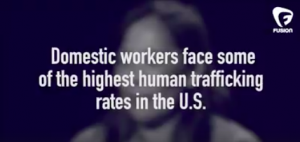As I was browsing through my newsfeed on Facebook yesterday afternoon, I came 
across a video shared by the National Domestic Workers Alliance, my site placement for the summer. The video highlighted the powerful story of a domestic worker from the Philippines named Judith. In the video, Judith shares the abuse, hunger, and injustice she faced as a human trafficking victim working as a domestic worker for a diplomat in the United States. The experiences Judith shares to the public, as both a domestic worker and a survivor of human trafficking, are not uncommon. In fact, the video points out that, “Domestic workers face some of the highest human trafficking rates in the U.S.” Today, as part of the Damayan Migrant Workers Association, Judith now helps human trafficking victims escape their situations. But for each domestic worker who manages to escape, there are many more who are still exploited and silenced.
Because domestic work is undervalued and unregulated, domestic workers are more likely to be victims of human trafficking and eventually end up in a situation that resembles slavery rather than work. These conditions are as equally pervasive around the world as they are here in the United States. But this is the case in the U.S. because domestic workers have been historically excluded from the National Labor Relations Act, an act that is supposed to protect the rights of the employers and the employed. The NLRA was established in 1935, and when we consider the history of the NLRA, we learn that the 1935 Congress strategically left out agricultural and domestic workers- two labor sectors with predominantly African American workers.
Our United States government has historically disenfranchised individuals because of the color of their skin, and this is still being perpetuated to this day. We are left with the appendages of faulty legislation that was created on the foundations of racist beliefs; and while we can’t go back and erase history, we can look forward and work towards the inclusion of historically marginalized individuals by fixing this exact faulty legislation. It is by organizing and allowing voices such as Judith’s to be heard that we can start to raise consciousness and give light to issues that we may not automatically think are pervasive in the United States.

This is a powerful story and a great blog, thank you for sharing it.
Uplifting the voices of people affected by human trafficking and worker abuse is critical. We, in the United States, have to recognize that we are participating in human rights violations and need to be held accountable.